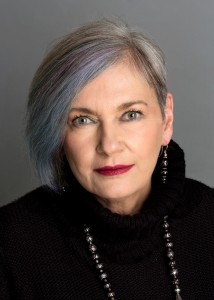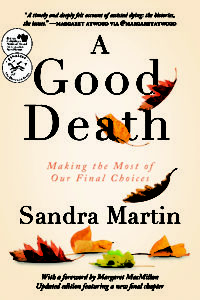http://www.macleans.ca/politics/ottawa/qa-sandra-martin-on-how-to-legislate-doctor-assisted-death/ …
Author & Journalist
The right to a “good death?” @semartin71 stops by to discuss physician-assisted death: http://bit.ly/1Wqvn4q
People ask me if I timed the release of A Good Death to coincide with the tabling of Bill C-14, the federal government’s proposed legislation on medical aid in dying. The answer is no. I researched and wrote my book based on the timetable established by the Supreme Court of Canada. It was pure coincidence that the Liberal government tabled its legislation on the day of my book launch.
Nevertheless, I’m thrilled to tell you that A Good Death has debuted on three bestseller lists: Maclean’s, The Globe and Mail and The Toronto Star. Thanks to everybody who is buying and reading my book. Please spread the work, and send me your reactions.
Let me tell you the backstory about the timing of A Good Death. The Court struck down the Criminal Code prohibitions against physician-assisted dying in its monumental decision in the Carter case in Feb. 2015, and suspended its ruling for a calendar year to give the federal government time to introduce and pass new legislation. The Harper government failed to respond for several months, called an early election, and lost to the Liberals, led by Justin Trudeau. You can read all about those dramatic events in A Good Death.
Once in power, the Liberals then petitioned the Supreme Court for a six month extension to give the government time to develop, introduce and pass a new law. The Court agreed, but limited the extension to four months, the amount of time that Parliament wasn’t sitting because of the lengthy election campaign, the longest in modern Canadian political history. Consequently, many suffering Canadians are petitioning Superior Court judges for an exemption, or waiting until June 6, 2016 for a new law and corresponding provincial legislation and regulations.
That’s the story behind the timing. A Good Death always had an April 2016 publication date, but the Court deadline changed. I will be blogging on the progress of Bill-C-14, so readers of A Good Death can follow my reactions to the parliamentary debate.
I’m going to post a list of events and appearances where I will be speaking and signing books. I hope to see you at some of them.
The federal government tabled its medical aid in dying legislation on April 12. Coincidentally that was the day of my book launch in Toronto at Ben McNally’s beautiful bookstore. Ben and his wife Lynn are old friends so it was a treat to have my book launch there. My husband and children were there along with many friends and Patrick Crean, my editor at HarperCollins Canada. I’ll be posting some pictures soon. It was a busy day, beginning with technical briefings on the proposed legislation, followed by a press conference.
The government is in a tough spot as it has a very narrow window in which to introduce, debate and pass Bill C-14 in the House and the Senate before the Supreme Court deadline expires on June 6, 2016. But that doesn’t mean the government should ignore the recommendations of its own joint parliamentary committee or retreat from the parameters set out in the Supreme Court ruling in Carter in Feb. 2015.
Here’s a link to a piece I wrote in The Globe in response to Bill C-14.
Most writers wait anxiously for reviews of their books. I’m one of them. As the publication date approached, I was in paroxysms of anxiety. Would A Good Death even be reviewed was my first worry, quickly followed by what would the reviewer say? I forced my husband to read the review of A Good Death in The Globe online on Friday, April 8th. He joked that I wouldn’t want to read it, and then told me the good news. Michael Harris, a writer I don’t know, read my book with intelligence and empathy and wrote about it favourably. Here’s a link to the review.

Thank for dropping in to my website.
If you have been here before you are probably used to reading news and articles about my book, A Good Death, a social history of the right to die movement in Canada and around the world.
I’m still writing about medically assisted death, but I am also interested in aging. We begin aging at conception, perhaps sooner, and most of us want to extend that process through long, healthy and productive lives. How do we do that? What do we mean by old in an era when three score years and ten has lost its resonance as longevity soars and centenarians are the fastest growing demographic in Canada?
Here’s a link to some recent articles on aging:
On a trip to the Galapagos, I confronted ageism as I communed with giant tortoises
CBC’s Sunday Morning interviewed me about my Walrus article
I’d like to tell you some good news about A Good Death. There are more details on other pages, but here are some highlights.
The paperback of A Good Death arrived in bookstores in early May, 2017. I have updated the first chapter and added a new one, “So Close and Yet So Far.” I write about the government’s Medical Assistance in Dying law, why it fails to comply with the Supreme Court decision in Carter, and what needs to be changed in the best interests of patients. We still have a long way to go in ensuring our final human right: choice in the way we die.

CPAC interviewed me for a Right to Die documentary as part of its Pillars of Democracy series.
Should terminally ill prisoners be entitled to ask for an assisted death?
Did Adam Maier-Clayton need to kill himself?
I reviewed Paul Kalinithi’s book, When Breath Becomes Air, in which he learned to live with his devastating diagnosis of end stage lung cancer. https://www.theglobeandmail.com/arts/books-and-media/book-reviews/review-paul-kalanithis-when-breath-becomes-air-is-an-exquisitely-moving-exploration-of-mortality/article28212547/
Here’s a brief introduction to the hardcover of A Good Death.
We can’t avoid death, but the prospect is a lot less terrifying since the Supreme Court of Canada legalized physician-assisted death. Competent adults, suffering grievously from intolerable medical conditions, will have the right to ask for a doctor’s help in ending their lives. That much is clear.
The challenge now is to pass legislation that reflects this landmark decision and develop regulations that reconcile the Charter rights of both doctors and patients. If we get the balance right between compassion for the suffering and protection of the vulnerable, between individual choice and social responsibility, we can set an example for the world.
A Good Death is timely, engaging and inspiring. In taking on our ultimate human right, award-winning journalist Sandra Martin charts the history of the right to die movement here and abroad through the personal stories of brave campaigners like Sue Rodriguez, Brittany Maynard and Gloria Taylor. Martin weighs the evidence from permissive jurisdictions such as the Netherlands, Oregon, California, Switzerland and Quebec and portrays her own intellectual and emotional journey through the tangled legal, medical, religious and political documentation concerning terminal sedation, slippery slopes, and the sanctity of life.
Modern death has become a wrenching political dilemma, one that becomes more pressing as the population ages. A Good Death confronts our fears about dying, our struggle for meaning, and our dread of being trapped by voracious medical technology in a nightmare world that has abandoned caring in pursuit of curing, no matter the cost or the suffering to patients and their families.
A Good Death asks the tough question none of us can avoid: How do we want to die? The answer will change your life—and your death.
Kobo: http://ads.harpercollins.ca/athrhcweb?isbn=9781443435987&retailer=kobo
Apple: http://ads.harpercollins.ca/athrhcweb?isbn=9781443435987&retailer=apple
Amazon: http://ads.harpercollins.ca/athrhcweb?isbn=9781443435987&retailer=amazon
Google: http://ads.harpercollins.ca/athrhcweb?isbn=9781443435987&retailer=google